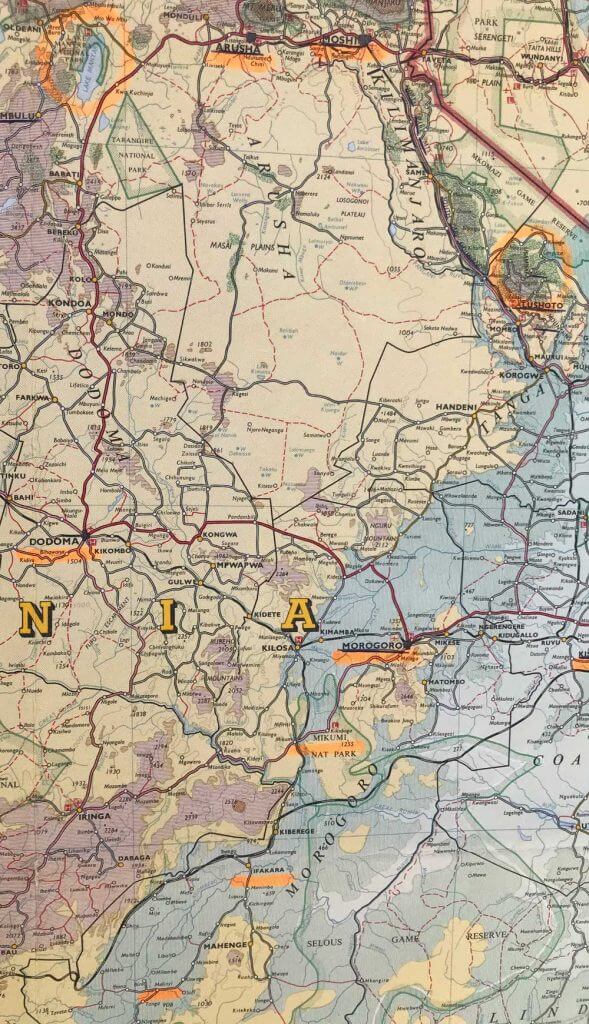#6: The Last Film Safari, 1975
My work on the documentary film for the Evangelical Lutheran Church in Tanzania proceeded throughout 1975. I travelled here and there, visiting sites where ELCT was engaged in health, support for women and youth, education and other projects. The plan was to write a script in English, from which the team could film and which would also be translated into Swahili and German. In the end, there would be three versions of the same film, each with the appropriate language — one for East Africa, one for the Lutheran countries of Europe and one for Lutherans in the States.
I wasn’t able to access a journal for my previous post about starting the ELCT film, but I did find one for the last trip before finalizing the script. Here are the day-to-day events of that safari, excerpts from my hand-written journal.
September 6-12
Dodoma – Morogoro – Ifakara – Malinyi
We left Arusha on the 6th, driving to Dodoma on a dusty road through increasingly desolate terrain of dry, alkaline desert. And yet there were usually signs of human habitation. [ELCT driver] Munisi says they are living on honey and water. It’s probably not true, but appropriately symbolic. I am hard-pressed to think of what they are eating.
Both Mr. L [Swedish missionary Treasurer of ELCT] and I were nauseated coming through the mountains south of Babati. Munisi drives fast, with skill — sometimes the body protests.
We saw a bus which had overturned, seemingly because of the [road’s] corrugation. No one badly hurt.
Another highlight: two gates like those at RR crossings which drop down to halt traffic when light planes come in to land across the road.
We were stopped at an Army roadblock out in the middle of nowhere, asked for I.D., sat around a lot and got stuck in the sand. Munisi spun the wheels again and again with Mr. L and me pushing in vain before some people came to help, even tho there were 30-40 civilians and Army people standing around watching. This lack of help happened several times during the trip — so different from other safaris.
We arrived at Dodoma around 3:30, a dusty, sandy town resembling a Wild West movie set. The majority of buildings are one-storied, modest affairs, and sand drifts around most structures. It’s extremely difficult to imagine that the [national] capital will be relocated here. One sign of the change in status is the proliferation of trenches for the civilian population in case of air raids by [Idi Amin]. It’s verboten to take photos.
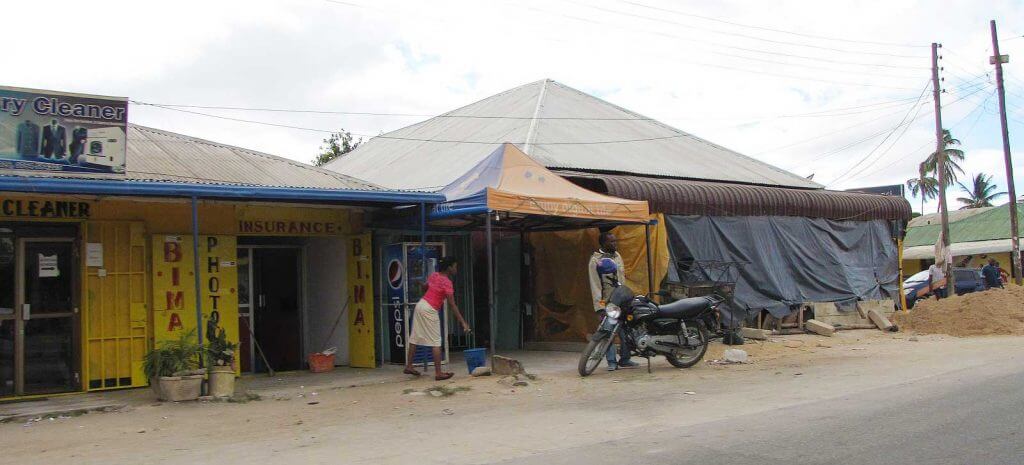
Mr. L and Munisi wangled me a place to stay at Foti’s Hotel, a two-story structure around a courtyard run by a Greek. The room was clean with an intact(!) mosquito net and private bath, altho the toilet had no plumbing. I was faced with the choice of peeing in the tub or dashing down the hall to the dirty public john. In either case, there was no TP, and my small store of tissues was sadly depleted.
We had dinner with Pastor R and his wife (also a pastor, but not active because of small children and, she adds, anti-female-cleric attitudes among African church officials). Mr. L was staying with them. Afterwards I practically fell asleep in the chair and returned to the hotel to be serenaded by drunks until midnight, when the nearby mosque took over the concert with more calls to prayer than usual during the night.
The next day, we proceeded to Jamhuri Stadium for the celebration of the 40th anniversary of the [ecumenical] Christian Council of Tanzania. We had seats, but most of the 1000s of people stood in the hot sun while we heard 4 choirs sing several numbers each; a military band play “The Hallelujah Chorus” and “Ein Feste Berg” badly; readings from the Gospel, Old Testament and Psalms; plus a lengthy sermon. We also sang several hymns ourselves and read two long responsive passages in Swahili. Along the way, there were innumerable, interminable speeches by representatives of governments, ELCT, diverse denominations and foreign delegations. The whole thing lasted from 9 til 12:30. A very African morning, true to centuries-old cultures with strong oral traditions.
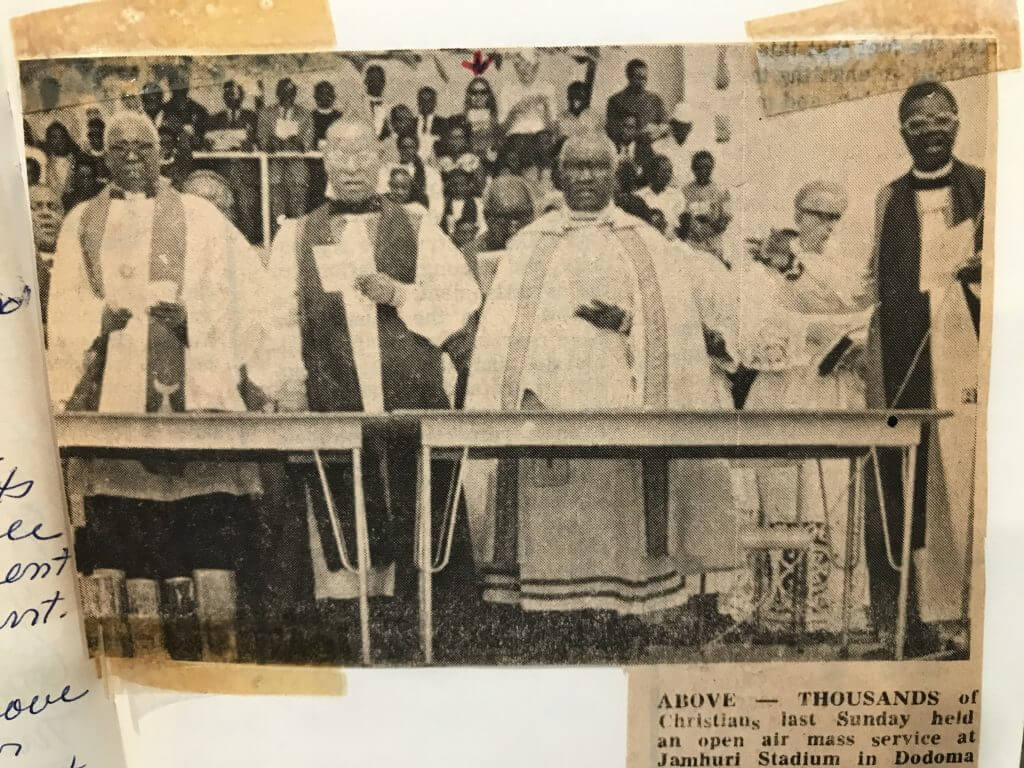 The ceremony won’t be in the film. We only detoured to Dodoma to pick up Mr. N, an African ELCT exec, who flew down yesterday to be a participant. He’ll accompany us on to Malinyi.
The ceremony won’t be in the film. We only detoured to Dodoma to pick up Mr. N, an African ELCT exec, who flew down yesterday to be a participant. He’ll accompany us on to Malinyi.
My afternoon was free, so I went back to the hotel to continue Captain Hornblower, R.N., the perfect sort of book for this kind of trip — full of action and easy reading. I returned to the Rs’ house for dinner and arrived to find the Acting German Ambassador and a CCT staff member there. A lively evening with discussions of politics, marriage, aid to developing countries and Jesus’s sex life(!).
The next morning, we left for Malinyi at 8:30, having collected Mr. N and an African pastor who lives there. We drove on a dirt road thru increasingly more fertile land, including kapok trees and cotton, until we came to Morogoro, where we had a lunch of stewed beef, potatoes, green beans and fruit at Mama Pereira’s.
If it’s necessary to move the capital inland from Dar es Salaam, I don’t know why they don’t put it in Morogoro, even if it isn’t the exact center of the country (neither is Dodoma, for that matter). It’s physically beautiful, fertile, well-supplied with transportation and communications, well-watered — all the things that Dodoma is not. One cannot help but wonder at the wisdom of what seems to have been a purely political decision.
After lunch, we travelled on tarmac through Mikumi Game Park, seeing elephant, zebra, gazelle, monkeys, baboons and giraffe. [As we sat together in the back seat,] Mr. N kept grabbing my hand and holding it when we sighted game. It made me very uncomfortable, because I didn’t know how to interpret the gesture. Several times during the day, he put his hand on my knee or thigh, and when we were momentarily left alone in the car, he put his arm around me. He surely must have seen my manner grow cold and should have taken a hint when I pulled my hand or knee away and put my bulky carry-all between us. He’s an ELCT exec, religious, warm and open to all. Is he also a dirty old man?
When we came to the village of Mikumi, we turned south on a dirt road, traveling more and more into a tropical belt with palms and sugar cane in abundance. We came to the ferry across the Kilombero River, a tributary of the Rufigi, at 5 p.m., and waited until 7, being passed up at one point by the Area Commissioner, who doesn’t have to wait his turn. We were only 3rd or 4th in line, but the ferry is small and manpowered, taking 20-30 minutes to go one way. It can go faster, but usually the passengers gave no assistance to the two men hauling several tons of weight across the river via a loop of heavy rope around a pulley. Again, this lack of cooperation and assistance was striking.
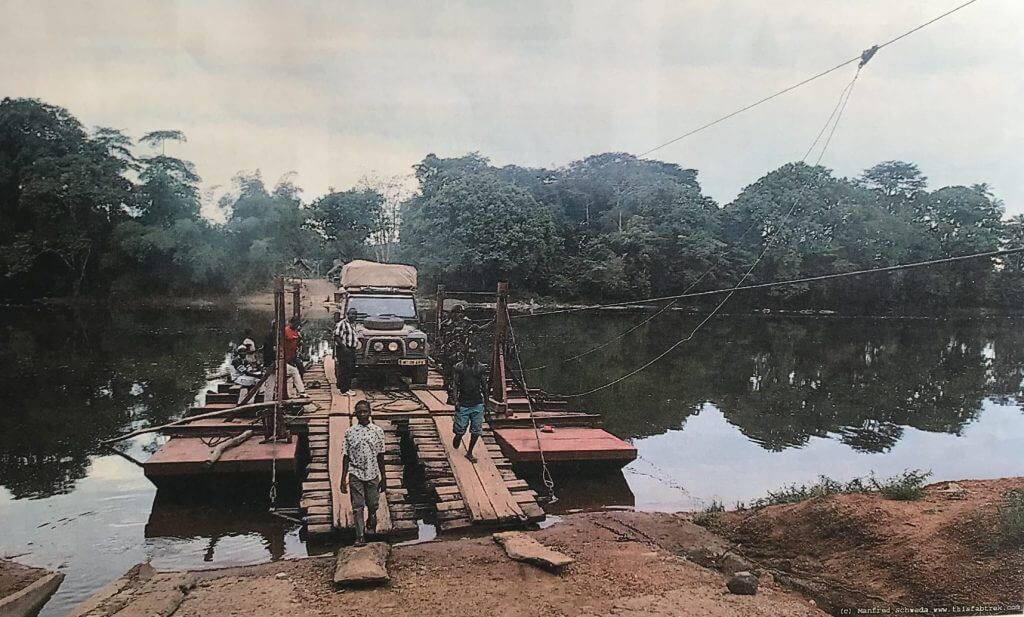
Ferry similar to ours. Photo courtesy of http://thisfabtrek.com
As we waited, I spoke with Mr. L about the inadvisability of bringing the film crew to Malinyi because of the high costs of transportation and time. I was a bit tired and cross from the long, hard trip and spoke with some force. Mr. L reiterated the problem of leaving one synod/diocese out of the film if all the others were included. It seems this synod did not exist last year, when the film plans were being made, but it has since split from Southern Synod because of difficulties in communication and cooperation, as well as tribalism. So ELCT feels they must be represented in the film.
We waited at the ferry until 7:00, some of us giving assistance to the crew on the trips back and forth. At 7, the crew quit and refused to take us. It was Ramadan, the sun had set, and they were going home to pray and eat, even tho we were the only vehicle left and even tho we had helped on the other trips. We were a little annoyed, but I was also relieved. These journeys are too far and too dangerous, especially in the dark. Malinyi is another 3 hours beyond the ferry.
We returned to the nearby town of Ifakara and went to the house of a German pastor who welcomed us, gave us orange juice and began a long conversation until the African pastor who came with us explained we needed dinner and a place to sleep. We all went to a restaurant run by the Catholic Mission and had rice with stewed meat and sodas.
Then we split up to stay at various places. I was sent to a convent of Swiss Catholic sisters, where we had to communicate in Swahili because they spoke little English, and I knew even less German. I had a very pleasant, simple room and an even more pleasant bath, tho the water was cold. The soap suds turned cafe-au-lait because of all the dust in hair, pores, eyebrows, nose and ears. I slept well until about 4 a.m., then was up and down the rest of the night with diarrhea, being careful not to tread on the two-inch cockroaches which my candle revealed.
I was all prepared for a super breakfast and an attempt to converse in French with the sisters, but I was served bread, butter and tea alone in my room.
We returned to the ferry and waited another two hours, during which time I read some more Hornblower and wrote a letter to my folks. Mr. L and I talked about the film some more, and he volunteered that probably we shouldn’t come to this synod after all and should just mention them in the script. I have mixed feelings about this. I think it’s the right decision for the film, but why didn’t someone reason this out before our coming hundreds of miles through 4 days of tough travel? I’m glad to have seen all this country, but I cannot help but also feel the trip [ended up being] for no purpose as far as the film is concerned.
We made it to Malinyi at about 1:30, having come through marshland and forest over decreasingly navigable roads. After a lunch of rice, stewed chicken, fruit and soda at the Church guesthouse, we rested until tea at 4. A Danish teacher and Danish nurse came by for a chat, and I obtained some medicine for my diarrhea from the African male nurse who came to treat Munisi’s sore arm (Rheumatism? Neuralgia? Driver’s elbow? He’s the sole driver for this whole, demanding trip.) Dinner was rice, stewed chicken, potatoes, cabbage and fruit, and I turned in early to read until the lights faded too much to see the print comfortably. Unlike Ifakara, they have electricity here all night, but it fades into a barely perceptible gleam.
After another breakfast of tea and bread, we went to services in the hospital chapel, then a few miles down the road to the Synod offices, where I climbed in a Land Rover and came all the way back past the guesthouse with two African church officials to the Tumaini [“Hope”] Youth Camp and Conference Centre. It’s not nearly as impressive in scope or personnel as the one at Mafinga, altho they have big plans for the future. The visit made me think we could show the fully-developed youth camp at Mafinga and say Malinyi is starting one there. Tea with lovely biscuits and doughnuts at the house of a Danish technical advisor before returning to the guesthouse where I wrote some of this, punctuated with a severe diarrhea attack.
Munisi came by and talked at length about his family problems since his wife committed suicide, [as well as] the general difficulties of bettering oneself via business or commercial farming under the current government. He would like to quit his ELCT job, sell his farm and house-for-rent, take his kids and start somewhere else in a commercial farm or business, but current laws and restrictions make that impossible. He’s very frustrated and resentful and says there are many throughout Tanzania who feel the same.
Mr. L and Mr. N returned before lunch, and Mr. L asked me if I thought we could do a good job of filming the Youth Camp. I replied in a gentle negative, fearful that they’d changed their minds and will film here after all. I inquired about who would talk to the Synod officials about the difficulties, and Mr. L said he would. So what gives?
The plan is to get up at 4 a.m. tomorrow and leave as soon as possible after breakfast for Arusha, a trip of some 15-18 hours on mostly dirt roads. Munisi says that if it rains tonight as it did last night, we won’t be able to make it to the ferry. It all seems pretty foolish — to go so far in such conditions, the worst part of the road in the darkness before dawn. There’s no telephone here to call home, only a radio-phone which could reach Kilimanjaro Christian Medical Center in Moshi. We could be stranded here for some time if the weather turns bad. Even in the best weather, it’ll be a grueling journey.
After a lunch of stewed duck, rice, salad, fruit and soda, I worked on revising the script until 4. No one came for tea, so I helped myself to a slice of bread and read Durrell’s Rosey is My Relative until 6, when I went to visit the Danish teacher. Her maid had kindly washed a couple of things for me, and I ironed them. The Danish nurse came by to report that the bus had got stuck on the road today — a bad omen. When the rains come, folks here can be cut off for weeks.
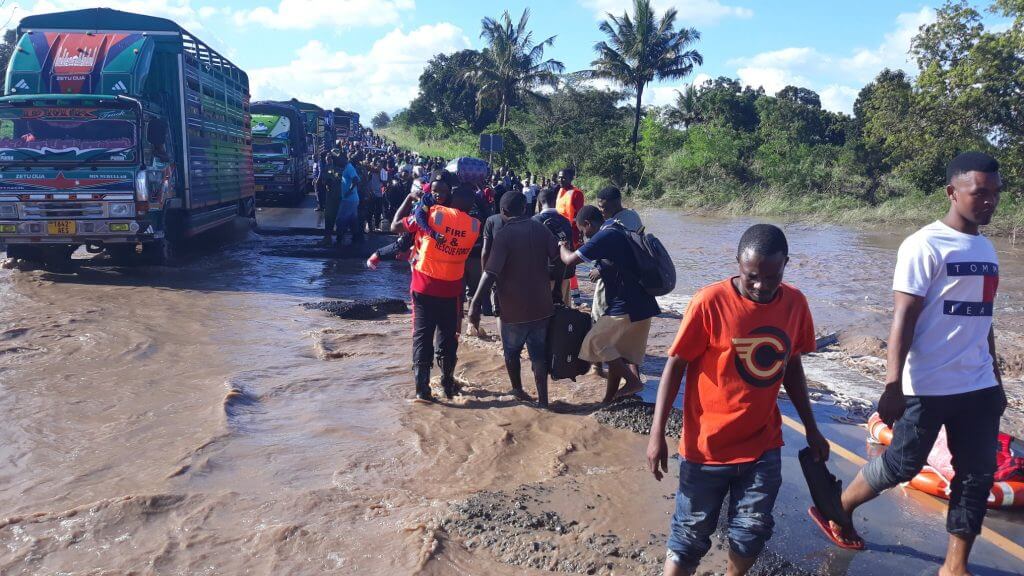
Typical road in rainy season. Photo courtesy of http://floodlist.com/
I returned to the guesthouse after dark, stamping my feet to ward off the snakes which abound here. Mr. L and Mr. N arrived soon after, and we sat down to a dinner which basically duplicated lunch. Afterwards, we joined the Danish women for coffee/tea, a lovely cake and macaroons. Our main meals have been pretty repetitive, but we get some tasty treats.
I was awakened the next morning at 3:15 by someone singing in the bathroom on the other side of the wall. Then Munisi knocked on my door at 3:30. After some bread and tea, which I could hardly get down, we set off for Arusha at 4:15. We had to stop several times for Mr. L to vomit along the side of the road, and I joined him in sympathy — my stomach had been protesting Munisi’s fast and jerky driving, but I wasn’t sick enough to heave until Mr. L did. Fortunately (in some ways) we also got a puncture coinciding with one of Mr. L’s attacks, so he and I set off on foot for about a mile, clearing nausea from our protesting tums.
Mr. N had been continuing his unwanted gestures, so I tried to use my private stroll with Mr. L to talk about what had been happening. Mr. L not only declined to trade places, so I could sit in the front seat [understandable, given his extreme motion sickness], but he also refused to believe what I said.
We arrived at the ferry around 7 a.m. and were second in line, when the truck which was just getting on as we arrived lost its brakes, crashing into the ferry and breaking the approach-planks. It took lots of talk, two trucks and two new tires to get the wrecked truck out of there. The tow-rope broke at one point, and the truck crashed back down causing more damage. The next truck got on with some difficulty, and they went across pole-pole [slowly-slowly] with only a couple guys hauling the thing across.
While we waited, Mr. L said I should write two alternative variations of the script, with and without the Tumaini Youth Camp, and they’d decide later whether or not to include it, depending on additional funding. This is a harder task than he realizes. It’s not simply a matter of taking out Mafinga and putting in Tumaini, because there are lots of cross-references that’ll have to be rewritten in both variations.
When our turn came to get on the ferry, too many pedestrians crowded on as well, and we sat on the ferry — stood, actually — for half an hour because no one would disembark, and it was too heavy a load. Finally they managed to get some to leave and pushed away from shore. Then all those who had left waded out and got back on, so we waited around while they tried to get the bad guys off again. We eventually made it to the other shore and drove on to Morogoro with few incidents except for Mr. L being sick a couple of times. At one point, we passed a magnificent waterfall to the left.
We lunched at Mama Pereira’s again and just drove and drove and drove, stopping at Mombo for tea, arriving in Arusha at about 9:45. I read The Eiger Sanction on the paved sections of the road until the light gave out, and then sat and planned all I have to do between now and when we return to the States. From the point-of-view of producing the film, I travelled for seven days through demanding country in order to spend a couple hours at a nascent youth camp not yet ready for inclusion in the film. With all the bad roads, GI tract problems, monotonous food and hassles about the script, I can’t say it was a productive trip. But I was glad to have seen two new regions of Tanzania.
***
Only a few months remained before we were to leave East Africa in early November, 1975. I wrote both variations of the script, one with and one without Malinyi, and delivered them to ELCT. Then I turned my attention to the myriad details of leaving a post — goodbyes, red tape, packing out and finding our next venue.
* * *
If you enjoyed reading this post, I hope you’ll SUBSCRIBE by clicking on the button below. Every month, when I post a new excerpt from my life overseas, you’ll get an email with a link so you can read the next installment. Subscription is free, and I won’t share your contact information with anyone else. Your subscribing lets me know you’re reading what I write, and that means a lot.

